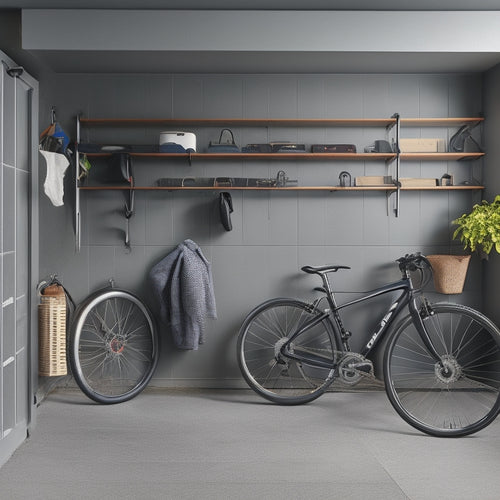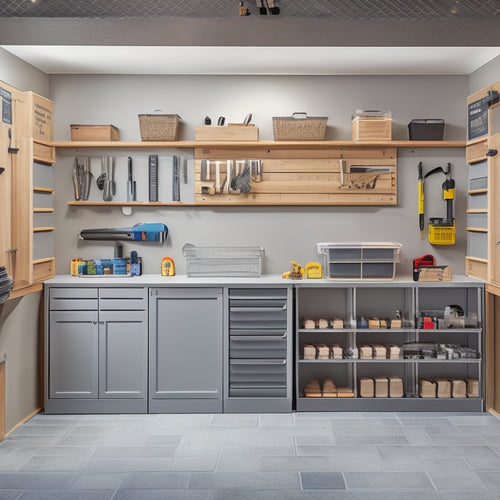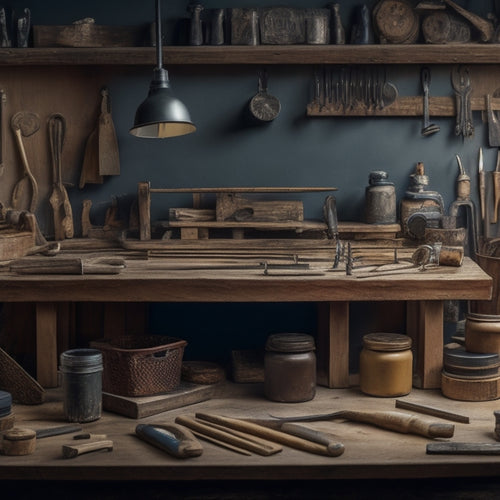
Is a Rolling Tool Box Worth the Investment?
Share
You're considering investing in a rolling tool box, and you're wondering if it's worth the cost. The answer is yes - with benefits like organized storage, enhanced portability, and improved workflow, you'll see a significant increase to your productivity and efficiency. Plus, a rolling tool box provides a safer work environment by minimizing physical strain and reducing accident risks. While the upfront cost may seem steep, the long-term benefits and savings make it a worthwhile investment. Now that you've got a sense of what's at stake, you're probably wondering what features to look for in a rolling tool box - and that's just the beginning.
Key Takeaways
- A rolling tool box provides organized storage, enhancing workflow, and reduces time spent searching for tools, increasing productivity and justifying the investment.
- Durability and build quality ensure a longer lifespan, reducing replacement frequency and enhancing overall value, making it a worthwhile investment for frequent users.
- Portability features, such as sturdy wheels and a durable frame, facilitate easy transport, reducing tool damage and loss risk, and enhancing flexibility in project execution.
- The investment potential is significant, with long-term savings possible through reduced replacement costs, increased productivity, and better project management.
- A rolling tool box is ideal for contractors, mobile professionals, or those with complex projects, providing a valuable return on investment through improved organization and workflow.
Benefits of a Rolling Tool Box
How often have you found yourself digging through a cluttered toolbox or searching for a specific tool in a disorganized mess? You're not alone. A rolling tool box can help alleviate this frustration by providing a more organized and efficient way to store and transport your tools.
One of the key tool box features of a rolling tool box is its ability to keep your tools organized and within reach. With divided compartments and adjustable shelves, you can customize the storage space to fit your specific needs.
Additionally, the portability advantages of a rolling tool box can't be overstated. With sturdy wheels and a durable frame, you can easily move your tools around the job site or to different locations without straining your back or wasting time.
Increased Mobility and Convenience
You'll appreciate the increased mobility and convenience a rolling tool box provides, as it allows you to easily access your tools without having to constantly bend or stretch.
This means you can quickly grab what you need and get back to work, reducing fatigue stress and saving you time and energy.
With your tools organized and within reach, you'll be able to work more efficiently and effectively.
Easy Tool Access
With your tools organized and within reach, you can swiftly respond to emergencies or tackle tasks as they arise, saving you precious time and energy.
Easy tool access is a significant advantage of a rolling tool box, particularly in high-pressure situations where every minute counts. When you can quickly grab the tool you need, you'll work more efficiently and reduce the risk of accidents caused by scrambling to find the right equipment.
Some benefits of easy tool access include:
-
Improved tool accessibility: Tools are neatly arranged and easily visible, eliminating the need to dig through a cluttered workspace or toolbox.
-
Enhanced workspace efficiency: With tools at your fingertips, you can focus on the task at hand, rather than wasting time searching for the right tool.
-
Increased productivity: Easy tool access enables you to work more quickly and accurately, leading to higher-quality results and increased job satisfaction.
- Better safety: By reducing the likelihood of accidents caused by haste or frustration, you can create a safer working environment for yourself and others.
Reduced Fatigue Stress
A rolling tool box's easy tool access also sets the stage for another significant benefit: reduced fatigue stress. You'll experience less physical strain when you don't have to constantly bend, lift, and stretch to reach your tools. This reduced strain translates to decreased fatigue, allowing you to work more efficiently and safely throughout the day.
The ergonomic design of a rolling tool box takes into account the physical demands of your job, providing a convenient and accessible storage solution that minimizes the risk of injury.
By keeping your tools within easy reach, you'll avoid unnecessary bending, stretching, and lifting, which can lead to back, neck, and joint problems. This means you can focus on the task at hand without worrying about the physical toll it's taking on your body.
With a rolling tool box, you'll be able to work smarter, not harder, and enjoy a safer, more comfortable work environment.
Organization and Storage Capacity
The tool box's organization and storage capacity are critical factors in determining its overall functionality and value. As you consider investing in a rolling tool box, you'll want to think about how well it can keep your tools and equipment organized and within reach.
A well-organized tool box can save you time and reduce frustration on the job.
When evaluating a rolling tool box's organization and storage capacity, consider the following features:
- Adjustable dividers and compartments to customize your storage solutions
- Multiple drawers and trays to separate and categorize your tools
- A pegboard or hook system to hang frequently used items
- A large, open storage area for bulky equipment or supplies
Durability and Build Quality Matters
You need a rolling tool box that can withstand the rigors of your workspace, which is why you should look for tough materials used in its construction, such as heavy-duty steel or high-impact plastic.
Sturdy construction methods, like welded seams and reinforced corners, also assure the box can handle heavy tools and equipment.
Additionally, consider a box that's been weather resistance tested to confirm it can protect your tools from the elements.
Tough Materials Used
Several manufacturers understand that durability is key to a rolling tool box's success, which is why they opt for tough materials in their construction. You want a tool box that can withstand the rigors of daily use, and that's exactly what you get with high-quality materials.
When it comes to material durability, you'll find that top manufacturers use:
- Heavy-gauge steel for the frame and shelves, providing maximum strength and support
- Durable polypropylene or polyethylene for the drawers and compartments, resisting scratches and corrosion
- Reinforced aluminum or steel for the handles, guaranteeing a secure grip even when fully loaded
- Weather-resistant coatings and sealants to protect your tools from the elements
These materials not only guarantee the tool box itself lasts longer but also provide superior tool protection.
You can trust that your prized tools will remain safe and secure, even in harsh environments. By investing in a rolling tool box with tough materials, you're investing in the longevity of your tools and the success of your projects.
Robust Construction Methods
A well-built rolling tool box relies on solid construction methods to guarantee durability and longevity. You expect your tool box to withstand the rigors of daily use, and that's exactly what a strongly constructed one will do. The construction techniques used will determine how well your tool box holds up against wear and tear.
Look for a tool box built with reinforced frames, sturdy handles, and secure latches. These features will make sure your tool box remains stable and secure, even when fully loaded.
Material selection is also essential. A tool box made from high-quality, heavy-duty materials will be more resistant to damage and corrosion. Check if the tool box is built with rust-resistant coatings, durable finishes, and strong welding.
A well-constructed tool box will keep your tools organized, protected, and within reach, giving you peace of mind and allowing you to focus on the task at hand. By investing in a tool box with strong construction methods, you're investing in your own productivity and safety.
Weather Resistance Tested
Three key elements make a rolling tool box weather-resistant: a watertight seal, rust-proof materials, and a protective coating. You want to guarantee your tools stay dry and protected from the elements, regardless of the job site conditions. A rolling tool box with these features will help prevent water damage, rust, and corrosion.
Some important weather resistance features to look for include:
- IP67-rated watertight seals to keep moisture out
- Rust-proof aluminum or stainless steel construction to withstand harsh environments
- Durable, UV-resistant coatings to protect against fading and cracking
- Drainage holes to prevent water accumulation
When evaluating a rolling tool box's weather resistance, consider the environmental impact of your tools and equipment.
Will they be exposed to rain, snow, or extreme temperatures?
Will they be stored in a humid or wet environment?
Types of Rolling Tool Boxes Available
Your toolbox is about to get a whole lot more organized and mobile with a rolling tool box. You'll have various options to choose from, each with its unique set of tool box features and storage options.
First, there are compact rolling tool boxes, ideal for small workshops or DIY projects. These boxes usually have a single lid and limited storage space, making them perfect for storing essential hand tools and small equipment.
Next, you have mid-size rolling tool boxes, which offer more storage capacity and often feature multiple drawers or shelves. These are suitable for professionals who need to store a variety of power tools, accessories, and consumables.
Lastly, there are large, industrial-grade rolling tool boxes designed for heavy-duty use. These typically have multiple lids, drawers, and shelves, providing ample storage space for an extensive range of tools and equipment. They're perfect for large workshops, construction sites, or mechanics.
When selecting a rolling tool box, consider the type of tools you need to store, the available space, and your mobility requirements.
Cost and Value for Money Analysis
Investment decisions often boil down to cost and value for money, and a rolling tool box is no exception. You need to weigh the upfront cost against the benefits you'll reap over time. A rolling tool box can be a significant investment, with prices ranging from a few hundred to several thousand dollars.
However, it's crucial to evaluate the cost comparison between a rolling tool box and other storage solutions.
When evaluating the cost, reflect on the following factors:
-
Durability: A high-quality rolling tool box can last for years, reducing the need for frequent replacements and saving you money in the long run.
-
Organization: A well-organized tool box can help you work more efficiently, reducing the time spent searching for tools and increasing your productivity.
-
Portability: A rolling tool box allows you to easily transport your tools to different job sites, reducing the risk of damage and loss.
- Investment longevity: A rolling tool box can be a long-term investment, providing a safe and organized storage solution for your tools for years to come.
Alternatives to Rolling Tool Boxes
Considering alternatives to rolling tool boxes is essential to making an informed decision. You may think a rolling tool box is the only solution for your tool storage needs, but there are other options worth exploring.
Portable chests, for instance, offer a compact and lightweight alternative. They provide easy access to your tools and are often more affordable than rolling tool boxes.
Another option is a tool backpack, which allows you to carry your tools on your back, freeing up your hands for other tasks. If you need to store larger tools, consider a stationary tool cabinet or a pegboard with hooks and bins. These solutions can be mounted on a wall or placed in a corner, keeping your tools organized and out of the way.
When evaluating these alternatives, think about your specific needs and priorities. Do you need a portable solution or a fixed storage system? What's your budget, and what features are must-haves for you?
Is a Rolling Tool Box Right for You
The decision to purchase a rolling tool box hinges on several key factors, including the type of projects you work on, the frequency of tool use, and your available storage space.
You need to evaluate your personal preferences and project requirements to determine if a rolling tool box is the right fit for you.
-
Do you work on large, complex projects that require a wide range of tools? A rolling tool box can help you stay organized and efficient.
-
Are you short on storage space in your workshop or garage? A rolling tool box can provide additional storage and flexibility.
-
Do you frequently work on-site or at different locations? A rolling tool box can make it easy to transport your tools and equipment.
- Are you willing and able to invest in a high-quality tool box that meets your specific needs? A rolling tool box can be a worthwhile investment if you're willing to spend the money upfront.
Frequently Asked Questions
Can a Rolling Tool Box Fit in a Small Workshop or Garage?
You'll find that a rolling tool box can fit in your small workshop or garage if you prioritize space efficiency, opting for compact storage solutions that maximize vertical space and keep frequently used tools within easy reach.
Are Rolling Tool Boxes Suitable for Outdoor or Construction Sites?
When working on outdoor or construction sites, you'll face durability concerns, weather resistance issues, and space limitations, but a rolling tool box's mobility advantages and organized design can help you traverse accessibility issues and keep your tools within reach.
Can I Customize a Rolling Tool Box to Fit My Specific Needs?
You can tailor a rolling tool box to fit your unique needs by exploring customization options, such as adjustable dividers, removable trays, and specialized inserts, to optimize tool organization and guarantee efficient access to your equipment.
Do Rolling Tool Boxes Come With Locks or Security Features?
You'll find rolling tool boxes often come with lock types like keyed, combination, or electronic locks, offering various security options to safeguard your precious tools and equipment, giving you peace of mind on the job site.
Can I Use a Rolling Tool Box for Non-Tool Storage Purposes?
You might think a rolling tool box is only for tools, but you can actually use it for alternative storage, getting creative with uses like storing office supplies, linens, or even out-of-season clothing, keeping your space organized and safe.
Conclusion
As you weigh your options, consider the cumulative conveniences a rolling tool box can bring to your workspace. Conveniently carting critical components, corralling clutter, and conserving coveted countertops, a quality cart can catapult your productivity. Calculate the cost against the cumulative benefits, and chances are, a sturdy, spacious, and smartly designed rolling tool box will prove a prudent purchase, providing a precise and practical solution for your professional pursuits.
Related Posts
-

Large Wall Hooks to Maximize Garage Space
You can effectively double your garage's storage capacity by installing large wall hooks that keep items off the floo...
-

Essential Steps for Garage Storage System Design
You're about to change your cluttered garage into an organized haven by following a structured approach to garage sto...
-

Top 5 Small Tool Organizers for Your Workshop
You're looking to optimize your workshop's efficiency with high-quality small tool organizers. Compact storage soluti...


